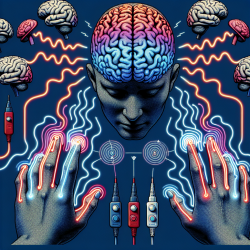Introduction
As professionals dedicated to enhancing the lives of children, understanding the complex interplay between Attention Deficit Hyperactivity Disorder (ADHD) and child sexual abuse (CSA) is crucial. The systematic review titled "Disentangling the Associations Between Attention Deficit Hyperactivity Disorder and Child Sexual Abuse: A Systematic Review" offers valuable insights into this intricate relationship. This blog aims to guide practitioners in implementing research findings to improve therapeutic outcomes and encourage further exploration in this field.
The Link Between ADHD and CSA
The association between ADHD and CSA has been documented in numerous studies, yet the directionality of this relationship remains ambiguous. The systematic review by Langevin et al. (2021) synthesizes available research, highlighting the need for more rigorous studies to untangle this association. Most studies identified a significant link, often conceptualizing CSA as a precursor to ADHD. However, the lack of longitudinal studies and control for confounding factors such as trauma-related symptoms and other forms of maltreatment poses challenges in establishing causality.
Key Findings and Methodological Insights
The review analyzed 28 studies, uncovering significant associations between CSA and ADHD in most cases. However, the methodological quality varied, with limitations such as cross-sectional designs and lack of comprehensive assessments. Only one study employed a longitudinal design, underscoring the need for more robust research methodologies. Additionally, the review emphasized the importance of controlling for confounding variables, such as trauma-related symptoms and other forms of maltreatment, to better understand the ADHD-CSA link.
Implications for Practitioners
Practitioners can leverage these insights to enhance their therapeutic approaches. Here are some actionable steps:
- Differential Diagnosis: Consider the potential overlap between ADHD symptoms and trauma-related symptoms, such as PTSD, to avoid misdiagnosis.
- Comprehensive Assessments: Utilize multimethod assessments, including neuropsychological tests and multi-informant reports, to accurately diagnose ADHD and assess CSA experiences.
- Trauma-Informed Care: Incorporate trauma-informed practices into therapy to address the unique needs of children who have experienced CSA.
Encouraging Further Research
The review highlights the need for more longitudinal studies to clarify the temporal relationship between ADHD and CSA. Practitioners are encouraged to engage in or support research efforts that address these gaps. Collaborative studies that incorporate diverse samples and control for major confounding factors can provide a more comprehensive understanding of this complex association.
Conclusion
Understanding the intricate relationship between ADHD and CSA is essential for practitioners committed to improving outcomes for children. By integrating research insights into practice and supporting further research, we can enhance therapeutic approaches and ultimately create better outcomes for affected children.
To read the original research paper, please follow this link: Disentangling the Associations Between Attention Deficit Hyperactivity Disorder and Child Sexual Abuse: A Systematic Review.










